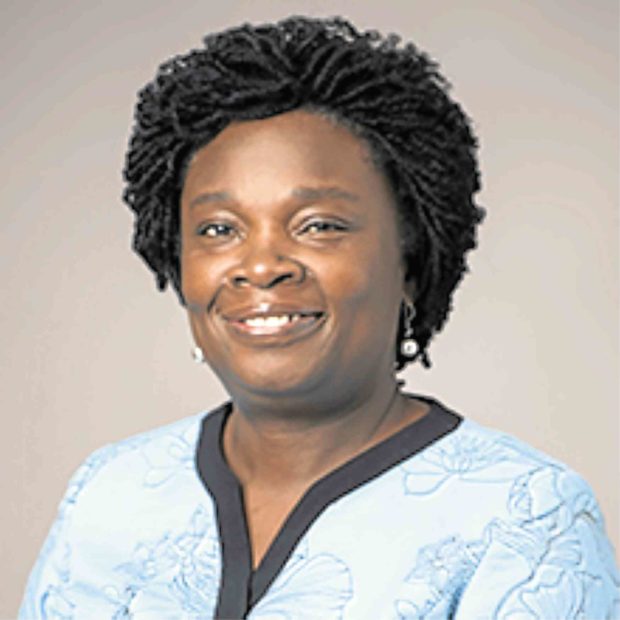Woman for others
As a child growing up in Ghana, Victoria Kwakwa did not dream of wanting to become a doctor or a lawyer as many young girls are wont to do.
Rather, she wanted to be an economist, preferably in an international organization that fights for the greater good.
Fast forward to today and Kwakwa has achieved what she set out to do, and the child of professionals has gone on to become vice president for East Asia and Pacific of the World Bank, overseeing a portfolio of more than $32 billion in loans, grants, credits, and trust funds across 23 countries, including the Philippines.
Kwakwa told the Inquirer in an interview at the World Bank office in the Philippines that growing up, she and her friends were in awe of Ghanaians who have had successful international careers. After Ghana gained independence, there were massive investments in human capital and that generated a crop of people who were sought after internationally.
“I looked at these people and I wanted to be like them,” said Kwakwa.
Kwakwa shared that it was her uncle, to whom she was very close, who first turned her on to the idea of also blazing her own path abroad.
She was also encouraged by her mother, a schoolteacher who taught in public schools, who said that she did not want either one of her children to also be a teacher. Neither did her father, who taught in university.
“They were determined that their children had to do better,” Kwakwa said.
And the 1980s was an exciting time to move abroad, especially for the youth who were coming out of university with the world ready to accept them.
Thus after graduating with an Economics degree from the University of Ghana, she pursued a Master’s degree and a Doctorate in Economics from Queen’s University in Canada.
She still taught for a few years, but she knew that while she enjoyed it, the academe was not quite where her aspirations were.
Fortunately, she got accepted into the Young Professionals program of the World Bank in 1989, beating hundreds of others who also wanted that rare chance to be involved in the highest echelons of development work.
It was a program designed to always inject the World Bank with new blood and once she got in and got involved in projects such as the 2000-2001 World Development Report on poverty, she never looked back.
As vice president for the region, Kwakwa leads the World Bank’s strategy in East Asia Pacific that focuses on five priority areas: Inclusion and empowerment; jobs and private sector-led growth, governance and institutions, infrastructure and urbanization, climate change and disaster risk management. The fast-growing region, whose share in the world economy is expected to rise to more than 30 percent by 2030, also focuses on the cross-cutting themes of gender, fragility and conflict and poverty analytics.
Kwakwa said she was determined to help Asia chart a sustainable development path, similar to what she wants Africa to pursue.
“In terms of similarities, both groups of countries are still charting a developing path and we want do even better,” she said, “Both are dealing with the same problems, poor quality education, stunting, malnutrition. One thing is also different, the population is aging rapidly, that is a concern in East Asia, but not yet so much in the Philippines.”
Kwakwa is also particularly concerned about the quality of rapid economic growth.
The goal is to make it inclusive, so that the greater part of the population benefits from fast growth, not just a mere fraction.
“Certainly inequality is the big issue because that sows the seeds of economic disruption and tensions. The ability of growth to impact poverty is reduced,” she said.
She said another daunting challenge was to find future drivers of growth because the old sources such as labor-intensive manufacturing are drying up, or are no longer as powerful.
“Increasingly, that will not be the source of growth. It will be there for a while but with automation and technological advancements, labor markets will be reshaped,” she said. “How will countries position themselves to be competitive? These are among the issues that several countries are thinking about.”
These are also among the issues that Kwakwa constantly wrestles with, but she won’t have it any other way.
She said the opportunity to engage with policymakers who look to the World Bank for advice on such areas as how to manage their economies or grow specific sectors keeps her energized, making her greet each day with enthusiasm.
“The fact that you can be part of that group of expertise, that is very humbling. It is a feeling of privilege that I think all of us in the Bank enjoy,” she said. “It is an honor to have these opportunities to make a difference.”
Before becoming vice president for the region, Kwakwa was a senior economist and lead economist from 2000 to 2006 in Abuja, Nigeria, where she set up a program of state-level analytical work and provided policy advice on how to efficiently and transparently manage oil revenues.
Kwakwa was also country manager for Rwanda for two years, where she worked with the government to design and pilot programs on social protection, health financing and agriculture productivity.
Kwakwa was also country director for Vietnam, overseeing a multibillion-dollar lending portfolio and an innovative knowledge program, including the recently published Vietnam 2035 report. This report, prepared jointly with the Government of Vietnam, presents options for Vietnam to achieve its ambitious goal of becoming an upper-middle-income country in a generation.
Eventually, she hopes to go back to the country of her birth. But in the meantime, Kwakwa has the region to take care of, and she could not be any happier.

